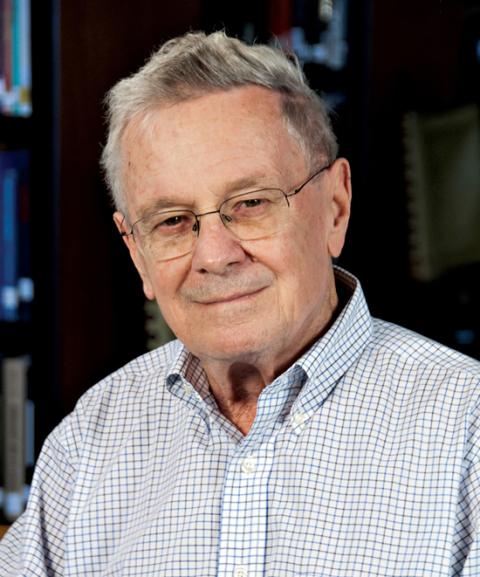
Daniel Callahan, pictured in an undated photo (CNS/Courtesy of The Hastings Center)
Dr. Daniel Callahan, who has been called the "father of bioethics," and who died on July 16 of this year, was not only a seminal thinker and prolific author, he was also a very good man.
I got to know Professor Callahan in the early 1970s as his student, when he taught a graduate level social ethics course one summer at the University of Pennsylvania. At that point, medical ethics were focused on abortion and contraception. The papal encyclical on birth control, Humanae Vitae, was just a few years old, and Joseph Fletcher's "situational ethics" was becoming very influential.
Dan had become a spokesperson for a "new" Catholicism after publishing The Mind of the Catholic Layman (1963), Honesty in the Church (1965), and "The Catholic Case for Contraception" (1969). Then in 1970, with a grant from the Ford Foundation, he examined abortion laws around the world and challenged and criticized the position of Roman Catholicism. The Kirkus review called it "an excellent, comprehensive examination of an issue whose time is now." He was unafraid to examine the full implications of his position as he did in an essay on the reproductive rights of fathers to their offspring.
Those were some of the topics that we discussed in class. Even though Professor Callahan was trained in analytic philosophy at Harvard, he adopted a Socratic approach in the classroom. His ethical approach was normative and applied. His overarching concern was how ethics worked in the real world. It was clear from the beginning that he welcomed challenges to his positions. We were a group of students who were immersed in thinking about ethical issues, but pleasantly surprised to have a teacher who was so open to such diverse points of view. For him, the classroom was really a place to seek truth.
Some of his thinking was focused on issues that we had barely considered. How many ethicists at the time were writing about the field of genetics or the new technology which he examined in The Tyranny of Survival (1973). In an NPR interview, he wondered why we were spending so much money on technology when we didn't know how to teach math to kids very well. He possessed a dazzling mind, but his presentations, especially his sincere questions about a controversial topic, were full of wit and humility.
Dan lived in a time of major advances in medical technology, from neonatal units to organ transplants, so of course these became topics for lectures and publications. His contribution to the current debate about death and dying was profound. He could talk about death without being morose, as he set the tone for questions that inevitably rose about euthanasia. He insisted that we spend as much time caring as we do curing. It almost seems like the confluence of medical breakthroughs and their ethical implications was made for this passionate, profound, curious thinker.
Just four years ago, at age 85, Callahan addressed the Harvard Medical School Center for Bioethics and in what could be a valedictory, assured the students that "there was no single way of dealing with the really complex problems they would face." I hadn't seen him speak in almost 45 years. But he was still the same humble man I got to know at Penn. For ten weeks, after class was over, I drove him to 30th Street Penn Station, where we waited together over coffee for his train back to his home on the Hudson. It was usually an hour or so wait, but I took every minute I could get. He did not eschew the title of the "father of bioethics" nor should he. He has left his children with few answers, but rather the most valuable legacy possible: the ability to ask the right questions.
[Wayne Johnson received his doctorate in Social Ethics from the Department of Religious Studies at Temple University in 1973. He is an animal rights activist and a practicing psychotherapist.]
Advertisement





